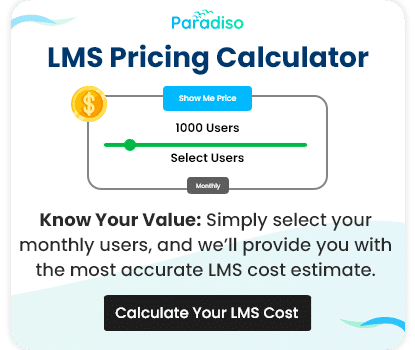Online Educational content is available in varied forms to accommodate a wide range of learning requirements. Custom courses and off-the-shelf courses are the two most common methods used in course development. With the various benefits and factors that each approach offers, educators and organizations may provide successful eLearning opportunities.

Off-the-shelf vs. custom courses: Which is better?
One question that frequently arises among those involved in the eLearning community is whether it is better to create original custom content or use pre-made materials. We aim to compare custom and off-the-shelf courses in this article, outlining their advantages and differences, to help you decide which one fits better for your organization.
However, there are many factors to be considered before choosing a course of action. Some are a result of the business’s needs, unique requirements, or the nature of the enterprise. Also, the platform features, tools, and integrations play a big part when opting for off-the-shelf vs custom courses.
Custom Courses: Customized eLearning Experiences vs. Off-the-shelf Courses
In the e-learning context, “custom courses” refer to educational materials and learning opportunities specially created and developed to satisfy the requirements, goals, and preferences of a given audience or company. These courses are completely original, with instructional design, content, and learning activities customized to meet specific requirements and learning goals.
The terms “off-the-shelf,” or “ready-made,” or “pre-packaged” refer to standardized instructional materials created by outside content providers or suppliers. These courses are available for purchase or license by educational institutions, organizations, or individuals for online learning. They are designed to cover a wide range of topics.
Custom eLearning Solutions vs Off-the-Shelf Courses: Differences
| Feature | Custom Courses | Off-the-Shelf Courses |
|---|---|---|
| Development Process | Customized to meet certain requirements and goals. | Pre-developed and standardized. |
| Content | Tailored To Meet Specific Organization’s Needs | Pre-Built and Generic Content |
| Personalization | Highly personalized learning experiences. | Limited personalization; standardized content. |
| Flexibility | Maximum flexibility in content and format. | Limited flexibility; follow a standardized structure. |
| Relevance And Engagement | More relevant and engaging | May not resonate with all learners |
| Cost | Higher initial investment due to customization. | Lower initial investment; cost-effective solution. |
| Time to Deploy | Longer development time due to customization. | Quick deployment; ready-made content. |
| Scalability | Can be scaled and adapted to evolving needs. | Limited scalability; may require additional purchases. |
| Expertise Required | Requires expertise in instructional design and content creation. | Minimal expertise required for implementation. |
| Ownership And Control | Full ownership and control | Limited control over content |
| Examples | Corporate training programs, university courses. | Compliance training, software tutorials. |
Things to check before making a choice between custom courses or off-the-shelf courses
Business Type: To determine which kind of course best suits your needs, you must be aware of your requirements as well as your business objectives. If your business has the need to train employees in first aid or etiquette, for example, Paradiso Solutions can provide a course library with multiple off-the-shelf courses ready for your users/employees to start taking. Many companies have common training programs that are easy to find and buy from a course library because most of them have the same requirements.
However, it is frequently the case that businesses must provide close, customized training to their partners, customers, and staff. Here, you will need to choose a custom course development that is based on your specifications or instructions. Specifically, you will need very specific content that you provide along with your own materials and guidelines.
The cost: An off-the-shelf course might be more affordable if multiple purchasers contribute to the total cost of the item. You only need to pay once for the final course because it has already created, unlike professionally designed courses, which may cost more since the content is created specifically to meet your requirements.
Support and Upgrade: The benefit of using an off-the-shelf course is that its created by a company specializing in course development, so they will handle any updates that are required for the content, such as this edition or modifications to the course overall. Also, the course seller company must guarantee support for any doubt, inquiry, or malfunction of the course. On the other hand, a custom course is all yours, and the information, construction, start-up, and upgrade would depend on your requirements. Support could not be included in the service.
Why are custom courses better than off-the-shelf courses?
While custom courses and off-the-shelf courses have their own value, custom courses are often considered ten and considered a better choice for meeting specific organizational needs and achieving targeted learning outcomes. Here are several reasons why custom courses may be preferred over off-the-shelf courses:
Organizational Goals:
Custom courses are designed to precisely align with the organization’s unique goals, culture, and strategic objectives. Because of this, learning experiences will be more pertinent and effective and the training content will directly address the unique challenges and priorities of the organization.
Tailored Content:
Content can be created specifically for a target audience’s needs, tastes, and ability levels thanks to custom courses. By addressing specific learning gaps and challenges, custom courses enhance engagement and comprehension, leading to better retention and application of knowledge.
Flexibility and Adaptability:
Custom courses offer flexibility in terms of format, content, and delivery techniques, enabling the incorporation of multimedia materials, interactive components, and real-world scenarios that are suited to the learning objectives. Additionally, custom courses can be easily updated and adapted to reflect changes in content or learner needs over time.
Brand Consistency:
Tailored training programs can be created to honor the company’s branding standards, guaranteeing coherence in corporate culture, visual identity, and messaging. This reinforces the organization’s brand image and fosters a sense of cohesion among learners.
Tracking Results:
Assessment and tracking tools can be integrated into custom courses to track student progress and assess the training’s efficacy. By collecting data on learner performance and behavior, organizations can make informed decisions to optimize future training initiatives.
Competitive Advantage:
Custom courses are a sign of an organization’s dedication to employee development and organizational excellence. Customized training programs can differentiate them from competitors by offering unique learning experiences tailored to their specific needs and goals.
To SumUp!
In summary, custom courses offer a tailored, relevant, and engaging approach to employee training. By addressing specific learning needs, promoting engagement, and aligning with organizational goals, custom eLearning contributes significantly to enhancing employee productivity and overall organizational success. While off-the-shelf courses are convenient and affordable, organizations that want to get the most out of their training investments and see significant performance gains frequently choose custom courses.
To get more information about Paradiso Custom Course Development or Off-the-shelf courses, you can request a free demo.











